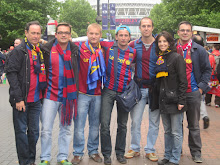Catalonia Yearns to Root for a Home Team of Its Own
By RENWICK McLEAN
Published: August 30, 2004
LLEIDA, Spain, Aug. 23 - In its eyes, Catalonia, the dynamic region that is contained in Spain but yearning for self-rule, is a wallflower at the Olympics. "We don't feel at all represented by the Spanish team," said Daniel Rovira, a bartender, as he watched a local soccer game on television, rather than the final of the men's 100-meter dash at the Athens Games. "We have our own language, our own culture.'' Nationalism flows thick in this ancient city of 120,000, a gateway between Catalonia and the rest of Spain. But that nationalism comes wrapped in the Catalan flag, not in Spain's. In his restaurant down the road from Mr. Rovira's bar, Jaume Areste Alonso switched the television from the Olympics to the same soccer game, the Catalonia Cup, a match between Barcelona and a crosstown rival, Espanyol - a preseason game at that. Mr. Areste Alonso said the Olympics would interest more people if Catalonia could compete with its own team. "It may take awhile, but the day will come," he said. "One hundred percent of the people here support it." Until then, sports fanatics from semiautonomous regions like Catalonia are sure to feel a little left out when they watch the Olympics, which brings together teams from about 200 countries, some as tiny as St. Kitts and Nevis. For these fans, the sense of local pride is as strong as their national identity is weak. That means that the athletic contests are not limited to the playing field, but enter into politics. During the four-decade dictatorship of Franco, regional languages and cultural celebrations were banned, so rooting for the Barcelona soccer team became a proxy for Catalan pride, one reason there is such a strong feeling about elevating regional teams. Some Catalans, like Mr. Rovira, the bartender, support full independence for Catalonia, but his is not a mainstream view. Sports is another matter. Catalans have gathered more than a million signatures calling for Catalans to have their own national team, he said. Convergència i Unió, a mainstream party in Catalonia, which does not advocate independence, says it will send Parliament a bill next month that will call on the national government to drop its opposition to allowing teams from Catalonia to compete internationally; the 16 other regions of Spain would get the same rights. In the Basque region, a largely autonomous area across the peninsula from Catalonia, a political party says it will propose similar legislation. "It's our dream, but it's also our right," said Josep Maldonado, a congressman who is leading the efforts for the Convergència party. In a telephone interview from Athens, where he had traveled to cheer on Catalan athletes representing Spain in the Olympics, Mr. Maldonado said proudly that "Catalonia is the world champion in high mountain races," referring to marathons at high altitudes. It also has been granted provisional membership in the International Federation of Roller Sports, he said. But in most sports, including soccer, the central government lobbies the governing federations to oppose the inclusion of Catalan teams, he said. The only way to stop the lobbying is through legislation, Mr. Maldonado said. Catalonia, like Spain's other regions, has substantial autonomy from Madrid, but is pushing for more from the new Socialist government. Political analysts say the government will have a difficult job satisfying them without loosening the political bonds that keep Spain a unified nation, not only at the Olympics. The International Olympics Committee may not want to hear from a nonstate like Catalonia, but there is little doubt that the region stands apart in many ways from Spain.
Although residents speak Spanish, most of the conversations overheard here are in Catalan. Waiters address customers in Catalan. Many of the signs leading to the city's most celebrated landmark, the Seu Vella cathedral, which was built in the 13th century, are only in Catalan. Asked how often he speaks Spanish, Manel Murgo, a 26-year-old salesman, said, "I speak Spanish when I go to Spain." His friend Daniel Puch, a 26-year-old businessman, said, "If I go up to a group of Catalans and start speaking Spanish, they look at me funny." Mr. Puch said he and his friends considered themselves Catalan first and Spanish second. In a game between a Catalan and a Spanish team, they would cheer for Catalonia. Catalonia has better athletes, not to mention better food, and a stronger economy, Mr. Puch and his friends said. But leaving all that aside, Mr. Areste Alonso said there was a final reason for preferring Catalonia. "Catalan is much prettier than Spanish," he said.
Monday, November 01, 2004
Subscribe to:
Post Comments (Atom)

No comments:
Post a Comment